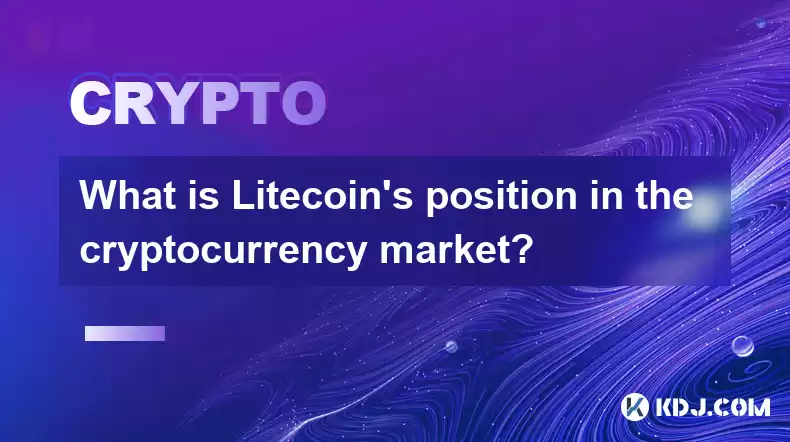-
 Bitcoin
Bitcoin $118800
-0.43% -
 Ethereum
Ethereum $4231
-0.53% -
 XRP
XRP $3.140
-1.41% -
 Tether USDt
Tether USDt $1.000
-0.02% -
 BNB
BNB $808.5
0.57% -
 Solana
Solana $175.1
-4.38% -
 USDC
USDC $0.9999
0.01% -
 Dogecoin
Dogecoin $0.2229
-4.71% -
 TRON
TRON $0.3458
2.18% -
 Cardano
Cardano $0.7744
-3.43% -
 Hyperliquid
Hyperliquid $43.19
-4.44% -
 Chainlink
Chainlink $21.19
-4.12% -
 Stellar
Stellar $0.4313
-2.84% -
 Sui
Sui $3.659
-5.59% -
 Bitcoin Cash
Bitcoin Cash $580.1
1.65% -
 Hedera
Hedera $0.2472
-4.61% -
 Ethena USDe
Ethena USDe $1.001
-0.03% -
 Avalanche
Avalanche $22.88
-3.98% -
 Litecoin
Litecoin $120.5
-2.63% -
 Toncoin
Toncoin $3.375
0.74% -
 UNUS SED LEO
UNUS SED LEO $8.984
-1.31% -
 Shiba Inu
Shiba Inu $0.00001296
-4.28% -
 Uniswap
Uniswap $11.06
1.08% -
 Polkadot
Polkadot $3.869
-4.65% -
 Cronos
Cronos $0.1664
1.09% -
 Dai
Dai $1.000
0.00% -
 Ethena
Ethena $0.7979
0.07% -
 Bitget Token
Bitget Token $4.395
-1.14% -
 Monero
Monero $268.2
-0.19% -
 Pepe
Pepe $0.00001125
-6.91%
What is Litecoin's position in the cryptocurrency market?
Litecoin, a significant altcoin, offers faster, cheaper transactions than Bitcoin, though its price remains volatile. Its active community and ongoing development contribute to its established position in the crypto market, but investment requires careful consideration of its risks.
Mar 11, 2025 at 11:41 pm

Key Points:
- Litecoin's role as a faster, cheaper alternative to Bitcoin.
- Its position as a significant, established cryptocurrency, though not among the top few by market capitalization.
- Litecoin's technological features and differences compared to Bitcoin.
- The community and development surrounding Litecoin.
- Litecoin's price volatility and investment considerations.
- Future prospects and potential developments for Litecoin.
What is Litecoin's position in the cryptocurrency market?
Litecoin (LTC) occupies a unique niche within the sprawling cryptocurrency landscape. While not commanding the market dominance of Bitcoin, it holds a significant position as a well-established and respected altcoin. It's often viewed as a "silver" to Bitcoin's "gold," reflecting its similar functionality but with key distinctions in transaction speed and cost. Understanding its position requires exploring its technical features, its community, and its overall market performance.
Litecoin vs. Bitcoin: A Technological Comparison
Litecoin's core functionality mirrors Bitcoin's, employing a similar blockchain technology for secure and transparent transactions. However, key differences exist. Litecoin boasts significantly faster transaction processing times and lower fees compared to Bitcoin. This is achieved through a different hashing algorithm (Scrypt vs. SHA-256) and a shorter block generation time. These differences make Litecoin a potentially more practical option for everyday transactions, particularly those requiring speed and cost-effectiveness.
The Litecoin Community and Development
Litecoin benefits from a dedicated and active community. This community contributes to its ongoing development, security, and adoption. Regular updates and improvements to the Litecoin network are evidence of this commitment. The community’s sustained engagement ensures the long-term viability and relevance of the cryptocurrency. This active development is crucial for maintaining Litecoin's competitiveness in the ever-evolving cryptocurrency market.
Litecoin's Market Capitalization and Price Volatility
While Litecoin's market capitalization is considerably smaller than Bitcoin's, it consistently ranks among the top cryptocurrencies. However, like most cryptocurrencies, Litecoin's price is highly volatile. Its value fluctuates significantly based on various market factors, including overall cryptocurrency market trends, technological advancements, and regulatory developments. Investors should be prepared for significant price swings when considering Litecoin as an investment.
Litecoin's Use Cases and Potential Applications
Litecoin’s faster transaction speeds and lower fees make it a suitable option for various applications. Its potential use cases include point-of-sale transactions, micropayments, and cross-border payments. As the cryptocurrency market matures and adoption increases, the demand for faster and more affordable transaction solutions like Litecoin is expected to grow. The success of these applications will play a crucial role in determining Litecoin’s future position in the market.
Future Prospects and Potential Developments
The future of Litecoin hinges on several factors. Continued technological advancements, such as improved scalability and integration with other blockchain technologies, are vital for maintaining its competitiveness. The growth of its community and wider adoption by businesses and individuals will also play a significant role in shaping its future. The overall regulatory landscape for cryptocurrencies will undoubtedly influence Litecoin's trajectory.
Addressing Common Questions:
Q: Is Litecoin a good investment?
A: Whether Litecoin is a good investment depends on individual risk tolerance and investment goals. Its price volatility makes it a high-risk investment. Thorough research and understanding of the cryptocurrency market are crucial before investing in Litecoin or any other cryptocurrency.
Q: How does Litecoin compare to Bitcoin in terms of security?
A: Both Litecoin and Bitcoin utilize robust blockchain technology to ensure the security of transactions. While the hashing algorithms differ, both are considered secure. However, the security of any cryptocurrency is also dependent on the strength of its community and the ongoing development of its underlying technology.
Q: How can I buy and store Litecoin?
A: Litecoin can be purchased through various cryptocurrency exchanges. Once purchased, it’s crucial to store your Litecoin securely using a reputable hardware or software wallet. Choosing a secure storage method is vital to protect your investment from theft or loss.
Q: What are the fees associated with Litecoin transactions?
A: Litecoin transaction fees are generally lower than Bitcoin’s. However, fees can still vary depending on network congestion. During periods of high network activity, transaction fees might increase.
Q: What are the environmental concerns surrounding Litecoin?
A: Like Bitcoin, Litecoin mining consumes energy. However, the energy consumption of Litecoin is generally considered lower than Bitcoin due to its different mining algorithm. The environmental impact of Litecoin, like other cryptocurrencies, remains a topic of ongoing discussion and research. Development of more energy-efficient mining methods is crucial to mitigate this concern.
Q: Is Litecoin decentralized?
A: Yes, Litecoin is a decentralized cryptocurrency. No single entity controls the Litecoin network, making it resistant to censorship and single points of failure. Its decentralized nature is a core feature that contributes to its security and resilience.
Disclaimer:info@kdj.com
The information provided is not trading advice. kdj.com does not assume any responsibility for any investments made based on the information provided in this article. Cryptocurrencies are highly volatile and it is highly recommended that you invest with caution after thorough research!
If you believe that the content used on this website infringes your copyright, please contact us immediately (info@kdj.com) and we will delete it promptly.
- Dogecoin's Wild Ride: Big Holders, Price Push, and What's Next for the Meme Coin
- 2025-08-12 08:30:12
- Bitcoin to $133,000? Here's What the Experts Are Saying
- 2025-08-12 08:30:12
- Dogecoin, Meme Coins, and Whale Buys: What's the Hype?
- 2025-08-12 06:50:12
- Bitcoin, Ethereum, and the Pump-and-Dump Merry-Go-Round: A New Yorker's Take
- 2025-08-12 07:10:12
- MAGACOIN Mania: Why Holders Are Staking Their Claim in This Bull Season
- 2025-08-12 06:30:13
- Heritage Distilling's Bold Bet: A $360M IP Treasury Powered by Story Protocol
- 2025-08-12 06:30:13
Related knowledge

How to purchase Aragon (ANT)?
Aug 09,2025 at 11:56pm
Understanding Aragon (ANT) and Its PurposeAragon (ANT) is a decentralized governance token that powers the Aragon Network, a platform built on the Eth...

Where to trade Band Protocol (BAND)?
Aug 10,2025 at 11:36pm
Understanding the Role of Private Keys in Cryptocurrency WalletsIn the world of cryptocurrency, a private key is one of the most critical components o...

What is the most secure way to buy Ocean Protocol (OCEAN)?
Aug 10,2025 at 01:01pm
Understanding Ocean Protocol (OCEAN) and Its EcosystemOcean Protocol (OCEAN) is a decentralized data exchange platform built on blockchain technology,...

Where can I buy UMA (UMA)?
Aug 07,2025 at 06:42pm
Understanding UMA and Its Role in Decentralized FinanceUMA (Universal Market Access) is an Ethereum-based decentralized finance (DeFi) protocol design...

How to buy Storj (STORJ) tokens?
Aug 09,2025 at 07:28am
Understanding Storj (STORJ) and Its Role in Decentralized StorageStorj is a decentralized cloud storage platform that leverages blockchain technology ...

Where to find the best price for Audius (AUDIO)?
Aug 11,2025 at 04:01pm
Understanding the Basics of Ethereum StakingEthereum staking refers to the process of locking up ETH tokens to support the security and operations of ...

How to purchase Aragon (ANT)?
Aug 09,2025 at 11:56pm
Understanding Aragon (ANT) and Its PurposeAragon (ANT) is a decentralized governance token that powers the Aragon Network, a platform built on the Eth...

Where to trade Band Protocol (BAND)?
Aug 10,2025 at 11:36pm
Understanding the Role of Private Keys in Cryptocurrency WalletsIn the world of cryptocurrency, a private key is one of the most critical components o...

What is the most secure way to buy Ocean Protocol (OCEAN)?
Aug 10,2025 at 01:01pm
Understanding Ocean Protocol (OCEAN) and Its EcosystemOcean Protocol (OCEAN) is a decentralized data exchange platform built on blockchain technology,...

Where can I buy UMA (UMA)?
Aug 07,2025 at 06:42pm
Understanding UMA and Its Role in Decentralized FinanceUMA (Universal Market Access) is an Ethereum-based decentralized finance (DeFi) protocol design...

How to buy Storj (STORJ) tokens?
Aug 09,2025 at 07:28am
Understanding Storj (STORJ) and Its Role in Decentralized StorageStorj is a decentralized cloud storage platform that leverages blockchain technology ...

Where to find the best price for Audius (AUDIO)?
Aug 11,2025 at 04:01pm
Understanding the Basics of Ethereum StakingEthereum staking refers to the process of locking up ETH tokens to support the security and operations of ...
See all articles

























































































